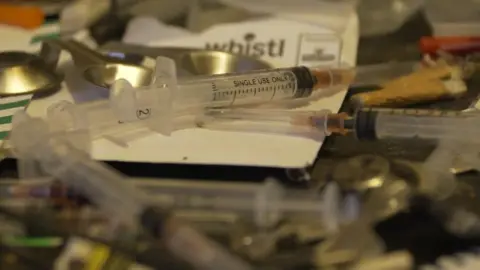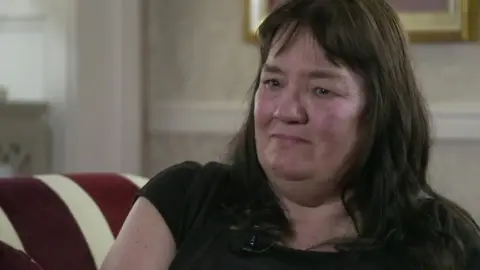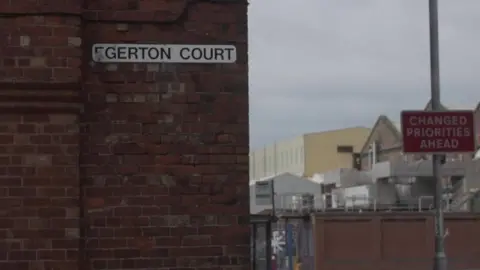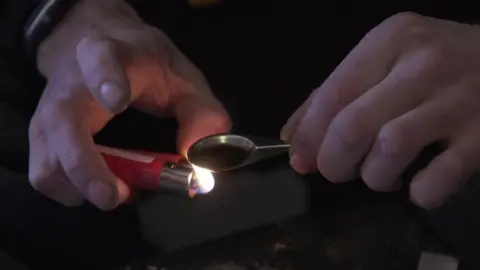Drugs leave 12 dead since December in a Cumbrian town
 BBC
BBCDrugs have killed 12 people in one Cumbrian town since December, making the death rate far higher than that of many cities.
Police say they are struggling to stem the tide of drugs such as heroin and crack cocaine in Barrow-in-Furness.
They say staff cuts are hampering their ability to tackle gangs arriving from as far away as London to sell them.
The county council blames government cuts for substantial reductions in drug and alcohol services.
"We will keep doing what we can within the resources that we've got," said Nick Coughlan, from Cumbria Police, "but inevitably, if the pattern continues, more people will die."
The police say they are struggling to tackle a problem known as county lines, where criminals from large cities target smaller towns.
In Barrow, the usual heroin and crack cocaine suppliers, gangs from Liverpool and Manchester, have been joined in recent months by London groups, happy to make the 600-mile round trip to exploit the town's longstanding drug market.
'It'll kill you'
Cumbria Police say budget cuts mean they have lost surveillance and intelligence officers, the mainstay of most drug teams.
While they have secured prison sentences totalling almost 200 years for drugs offences in the past 18 months across south Cumbria, Detective Chief Inspector Coughlan is realistic about the impact.
"It would be fair to say that we disrupt individuals and very, very soon after, there's someone to fill that void in the drugs market," he said.

Fay Johnson says her son Mark first started taking drugs, mostly cannabis, in his late teens.
Despite working as a cook in various hotels in the Lake District, he progressed onto harder, Class A substances, though his mother says she doesn't know the full details.
As Fay's only child, she would see Mark several times a week, often pleading with him to stop using "or it'll kill you".
The 35-year-old ignored his mother's warnings, and in January, her worst fears were realised when Mark was found dead in a flat he had recently moved into, leaving her heartbroken.
"They make their own choices, and it's only if they listen…" she says, fighting back tears.
"I miss him so much. I really do."
'Easy prey'
The deaths started in December, and since the BBC started investigating the problem in January, there have been eight more fatalities.
For a town of 67,000 people, the 12 deaths are "totally disproportionate" says Nick Coughlan, making the rate in Barrow far higher than in many cities.
Four of the deaths have occurred at Egerton Court, a dilapidated block of flats with crumbling masonry, boarded and smashed windows, discarded furniture and little hope.
Sitting just yards from where the town's largest employer, BAE Systems, is building the nation's nuclear submarines, the Ego, as it's known locally, is often the dumping ground for Barrow's most vulnerable residents.
Former prisoners, rough sleepers and drug addicts are regularly sent to one of the 144 flats in the complex, where the local council has paid out nearly £2m in the past year in housing benefit payments, according to a BBC Freedom of Information request.
Cooped up together, residents are easy prey for Barrow's dealers, who often entice residents with free drugs.
Once hooked, the dealers sometimes take control of a resident's property and use the address to sell drugs to others - a practice known as cuckooing, which is becoming increasingly common in Barrow.

"It's never been this bad," says Donna Stainton, who lives in a flat in another problem area of Barrow where one of the dozen died.
"You used to get the odd overdose now and again, but now it's constant."
'Higher risk'
Drug-related deaths are at record levels across Britain, with the latest figures showing 4,611 people died following drug misuse in 2016.
In Cumbria, an assessment in November by the county council found "the local death rate is currently significantly higher than the national average."
Despite this, the council has cut £1.3m from its budget for drug and alcohol services in recent years.
The November assessment also raised questions over whether the model of drug treatment the government has encouraged councils to follow, which emphasised recovery and abstinence over long-term methadone maintenance, might have harmed some users.

Taking a strict approach, such as ending treatment if clients relapse, "might mean that people who are not ready to become drug free are left without access to support and are put at higher risk as a result", wrote the county council's director of public health.
In a statement, Cumbria County Council said drug misuse was "extremely complex", and they regularly reviewed drug-related deaths "to improve the support we offer to those who misuse drugs".
"The commissioning of services is also largely dependent on budget - in Cumbria, we have one of the lowest public health budgets per head in the country, and austerity savings of over £200m in a 10-year period have meant that budgets across all council services have been reduced."
